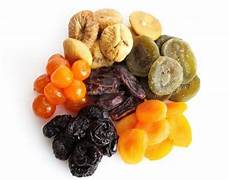Dried Fruits

Dried fruit is fruit that has had almost all of the water content removed through drying methods. The fruit shrinks during this process, leaving a small, energy-dense dried fruit. Raisins are the most common type, followed by dates, prunes, figs and apricots. Dried fruit is fruit that has been preserved by being dried; used especially to refer to currants, raisins, or sultanas, which are kinds of dried grapes. Dry fruits are rich in potassium, magnesium, calcium, zinc, phosphorus and various vitamins like vitamin A, D, B6, K1 and E. These nutrients are essential for a healthy immune system. According to a study, dry fruits with high levels of polyphenols help improve immunity by showing anti-inflammatory effects. When ancient Egyptian kings died, dried fruits were buried in their tombs with their treasures. By weight, dried fruit contains up to 3.5 times the fiber, vitamins and minerals of fresh fruit. Nuts and dried fruits are healthful foods because of their nutrient profiles. They provide dietary fiber, potassium (K) and a variety of health protective bioactive compounds. Nuts also are a source of protein and monounsaturated (MUFA) and polyunsaturated fatty acids (PUFA). People with diets rich in plant phenols have lower rates of heart disease, diabetes, several kinds of cancer, and possibly degenerative brain diseases. So, by all means keep eating dried fruits: they are full of healthy nutrients. But avoid the added sugars, and keep track of calories. Dried fruits are high in fiber. You need fiber in your diet to improve regularity and promote bowel health, but too much fiber bothers your gut, especially if you do not normally consume high-fiber foods. Dried fruits may cause you to have gas, abdominal cramping, bloating, constipation or possibly diarrhea.